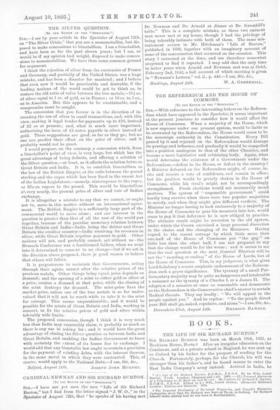THE REFERENDUM AND THE HOUSE OF COMMONS.
[To THE EDITOR or THE " SPECTATOR."] SIR,—With reference to the interesting letters on the Referen- dum which have appeared in the Spectator, it seems important at the present juncture to consider how it would affect the House of Commons. When a majority of the House, which, is now supreme under our present system, would be liable to be overruled by the Referendum, the House would cease to be the sovereign authority in the Constitution. Every Bill passed by it and rejected on the Referendum would damage its prestige and influence, and gradually it would be compelled into a position analogous to that of the other Chamber, and become a mere legislative and criticising body. Again, what would determine the existence of a Government under the Referendum,—defeat in the House, or defeat in the country ? A Minister defeated on the Referendum might., of course, in- vite and receive a vote of confidence, and remain in office ; but his position would be greatly shaken in the House of Commons, while his rival's might not be correspondingly strengthened. Fresh elections would not necessarily mend. matters. The system of " responsible government" could hardly long survive when there were two popular majorities. to satisfy, and when they might give different verdicts. The Minister no longer having to look exclusively to a majority of the House of Commons to pass his measures into law, would cease to pay it that deference he is now obliged to practice. The ultimate result might be reversion to the old system, under which the Crown exercised a large personal discretion in the choice and the changing of its Ministers. Having regard to the recent outrage by which little more than one-half of the House of Commons put " the gag " on little less than the other half, I am not prepared to say that the change would be for the worse ; and it seems to me that the real question at the next .General Election will be not the " mending or ending " of the House of Lords, but of the House of Commons. This, in my judgment, is what gives Lord Salisbury's recent emphatic endorsement of the Referen- dum such a grave significance. The tyranny of a small Par- liamentary majority may be quite as dangerous and intolerable a nuisance as the tyranny of a Charles I. or a James II. The adoption of a measure at once so reasonable and democratic) as the Referendum is the Conservative chief's answer to certain
Radical threats. They say loudly : " We will appeal to the people against you." And be replies : " To the people direct your Bill shall go, naked, repulsive, and alone."—I am, Sir, Sto.,
Devonshire Club, August 12th. EMERSON DAWSON.


































 Previous page
Previous page